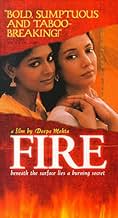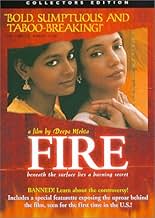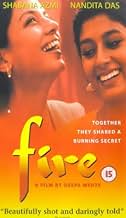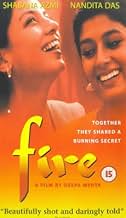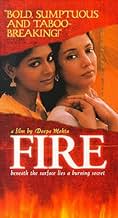IMDb RATING
7.1/10
6.6K
YOUR RATING
Two women who are abandoned by their husbands find love and solace in each other.Two women who are abandoned by their husbands find love and solace in each other.Two women who are abandoned by their husbands find love and solace in each other.
- Awards
- 7 wins & 1 nomination total
Jaaved Jaaferi
- Jatin
- (as Javed Jaffrey)
Devyani Saltzman
- Girl in video shop
- (as Devyani Mehta Saltzman)
- Director
- Writer
- All cast & crew
- Production, box office & more at IMDbPro
Featured reviews
9hira
This film powerfully demonstrates the struggle of two women in love in a culture so deeply entrenched in ritual and tradition. All this against a backdrop of an India which itself is struggling for freedom from these same values. This film is both political and personal and never too preachy or idealistic on either front. It is easy to see why "Fire" has caused riots in India, but tragic nonetheless. A true film such as this one deserves to be seen by all people of the world, not just privileged westerners.
Bold, controversial and taboo-breaking are among the many attention-grabbing words that have been used to describe 'Fire' and this has no doubt helped the film gain recognition. However, I feel that such adjectives undermine the true beauty of that is depicted in this picture. It deals with many themes such as feminism, affection, love and freedom and at the heart of the film lies the relationship between Seeta and Radha. The bond between them is portrayed with such innocence, tenderness, affection and sensibility that its beauty stands out. The growth in the two characters and the development of their relationship is splendid to watch. While the relationship is portrayed with sensuality, there is no titillation or overt skin exposure.
Due to the theme of homosexuality and the questioning of religion, 'Fire' was ridiculously banned in several countries. It is never specified whether Seeta or Radha were exclusively homosexual. They're never shown to not enjoy a sexual relationship with their respective male partners. Radha has made numerous attempts over the years to have that kind of intimacy with her celibate husband but he's the one who refuses while in Seeta's case, sex is a mechanical thing for her husband. What they Seeta and Radha find in each other is affection, love, desire and tenderness, something they yearned for but never had with their husbands.
Many have argued that Deepa Mehta deliberately uses shock value and portrays India as repressed in order to make her film appeal to the Western audience. I don't know whether that was her intention with 'Fire' but to me it felt like an honest movie and the problems portrayed in this film are still very much a reality in India. I would even go as far to say that this is among Mehta's best works. Her use of metaphors is brave and gives the film a poetic feel.
Mehta's films have often scored high in the technical department and 'Fire' is no different. Here the cinematography and A.R. Rahman's score particularly stand out. The music is mesmerizing. The art direction too is brilliant.
Luminous Nandita Das is terrific as the young, vivacious and energetic Seeta. Shabana Azmi is once again transcendent. Her nuanced, quiet and restrained performance easily touch on the heartstrings. Kulbhushan Kharbanda and Javed Jaffrey provide good support.
Forget all the labelling, controversial or not 'Fire' is worth seeing for the beauty it portrays when two people find love and freedom in each other.
Due to the theme of homosexuality and the questioning of religion, 'Fire' was ridiculously banned in several countries. It is never specified whether Seeta or Radha were exclusively homosexual. They're never shown to not enjoy a sexual relationship with their respective male partners. Radha has made numerous attempts over the years to have that kind of intimacy with her celibate husband but he's the one who refuses while in Seeta's case, sex is a mechanical thing for her husband. What they Seeta and Radha find in each other is affection, love, desire and tenderness, something they yearned for but never had with their husbands.
Many have argued that Deepa Mehta deliberately uses shock value and portrays India as repressed in order to make her film appeal to the Western audience. I don't know whether that was her intention with 'Fire' but to me it felt like an honest movie and the problems portrayed in this film are still very much a reality in India. I would even go as far to say that this is among Mehta's best works. Her use of metaphors is brave and gives the film a poetic feel.
Mehta's films have often scored high in the technical department and 'Fire' is no different. Here the cinematography and A.R. Rahman's score particularly stand out. The music is mesmerizing. The art direction too is brilliant.
Luminous Nandita Das is terrific as the young, vivacious and energetic Seeta. Shabana Azmi is once again transcendent. Her nuanced, quiet and restrained performance easily touch on the heartstrings. Kulbhushan Kharbanda and Javed Jaffrey provide good support.
Forget all the labelling, controversial or not 'Fire' is worth seeing for the beauty it portrays when two people find love and freedom in each other.
This intelligent, moving and beautiful film is a study in the ways people react to tradition (reminds me of William Faulkner's novels).
The characters all feel trapped by the weight of the roles they are expected to assume, and seek for a way to live within those roles rather than throw them off altogether. But as the story develops the two wives, trapped in loveless marriages, draw together. Drawing on the strength of their friendship and love, they give each other the courage to abandon their roles.
They have found that living within their traditions is no life at all, it is a sort of living death: without passion, without true connection to others, without fulfillment. Although they know there will be a price to be paid for their rebellion and freedom, it is a price much less dear than the sacrifice called for by a comfortable, predictable existence.
The screenplay is wonderful, the acting marvelous. Near perfect!
The characters all feel trapped by the weight of the roles they are expected to assume, and seek for a way to live within those roles rather than throw them off altogether. But as the story develops the two wives, trapped in loveless marriages, draw together. Drawing on the strength of their friendship and love, they give each other the courage to abandon their roles.
They have found that living within their traditions is no life at all, it is a sort of living death: without passion, without true connection to others, without fulfillment. Although they know there will be a price to be paid for their rebellion and freedom, it is a price much less dear than the sacrifice called for by a comfortable, predictable existence.
The screenplay is wonderful, the acting marvelous. Near perfect!
I was so pleased to discover this movie. The box here in America makes it sound like it is soft core porn with descriptions such as "erotic heat" and the like.
But I was moved by the relationship of these two women and how it reflected their place in society. I was so impressed by how Shabana Azmi (Radha) showed her character growing as she began to understand what she really needed in her life.
Also, early in the film I began to worry that maybe it would just be a movie about how younger women influence traditional families by bringing in new ideas, but the first time Radha and Sita make love, Sita (Nandita Das) seems innocent and unsure about what has happened (even though she initiates it.) I realize that as a character she is going through her own development that starts with a woman who is unsure of expressing her opinion to one who can give voice to what she thinks.
Also, how the family is portrayed seems real in that people do not just immediately change when presented with new ideas. What I mean is that in American movies, we have the tendency to have all the main characters "work things out" by the end of the movie. So when Radha's husband finds Radha and Sita together he doesn't just say he was wrong to ignore Radha and make it up to her. He struggles and falls just like real people do.
This was great work. Radha and Sita have a true romance and the world they occupy is believable and impressive.
P.S. Also a reviewer before me described several parts of the movie and said negative things about it, but couldn't have been watching it too closely since the reviewer confuses the names of all the principle characters. It is Radha that catches on fire not Sita, and Radha who is the elder wife.
Also, I disagree with the characterization that the movie portrays men as the bad guys. I feel it shows very human people. Even the eldest female character Biji turns a blind eye to the pain and feelings of her caregiver Radha. People (men and women) are not perfect and the mistakes made by Radha and Sita's husbands are real things that men actually do and think their wives should just go along with because they are the wives. Does that make them bad men? No. But it does make it a bad system, which I believe is the real foe in this film.
But I was moved by the relationship of these two women and how it reflected their place in society. I was so impressed by how Shabana Azmi (Radha) showed her character growing as she began to understand what she really needed in her life.
Also, early in the film I began to worry that maybe it would just be a movie about how younger women influence traditional families by bringing in new ideas, but the first time Radha and Sita make love, Sita (Nandita Das) seems innocent and unsure about what has happened (even though she initiates it.) I realize that as a character she is going through her own development that starts with a woman who is unsure of expressing her opinion to one who can give voice to what she thinks.
Also, how the family is portrayed seems real in that people do not just immediately change when presented with new ideas. What I mean is that in American movies, we have the tendency to have all the main characters "work things out" by the end of the movie. So when Radha's husband finds Radha and Sita together he doesn't just say he was wrong to ignore Radha and make it up to her. He struggles and falls just like real people do.
This was great work. Radha and Sita have a true romance and the world they occupy is believable and impressive.
P.S. Also a reviewer before me described several parts of the movie and said negative things about it, but couldn't have been watching it too closely since the reviewer confuses the names of all the principle characters. It is Radha that catches on fire not Sita, and Radha who is the elder wife.
Also, I disagree with the characterization that the movie portrays men as the bad guys. I feel it shows very human people. Even the eldest female character Biji turns a blind eye to the pain and feelings of her caregiver Radha. People (men and women) are not perfect and the mistakes made by Radha and Sita's husbands are real things that men actually do and think their wives should just go along with because they are the wives. Does that make them bad men? No. But it does make it a bad system, which I believe is the real foe in this film.
A melodramatic tale about the journey of two women towards Self-actualisation. This movie from the award-winning filmmaker Deepa Mehta perfectly depicts the illiberal ideas entrenched in our bigoted society. Mehta's Elements trilogy, Fire, Earth, and Water distinctly personify her visions and her elegance in filmmaking.
Sita(Nandita Das) is entering a new family after her wedding. The family consists of her spouse Jatin(Javed Jaffrey), her brother in law Ashok and his wife Radha(Shabana Azmi) and the matriarch of the family is Biji. Biji is taken cared by the servant Mundu but often infuriates the old lady.
Sita is a soul which dares to dream. She is bound by no shackles. But the married life has been quite tough on her after she found her husband to be cheating on her. During a conversation Radha tells Sita that she is infertile,"No eggs in ovaries " were the exact words to be precise and for that reason, her husband has vowed to celibacy under the influence of a Swamiji who has preached him that desire was the root of all evil. These two women gradually embrace each other and rediscover their sexuality and in the process rediscover their will to live a life that they wished to live in a cloudland.
Mehta's effort to intricately design the characters has a positive impact on screen as it wasn't judgemental rather each character's reflections of their opinions.Azhagi fame Nandita Das has flabbergasted us with her role. Takeshi's Castle fame Javed Jaffrey has made his role look so easy. The entire team has done just to their roles, making this a movie that every movie maniac will savour.
In 1998 Fire was screened in India.For its content of displaying Homosexuality as a non-evil custom, the movie garnered immense controversy. There were riots in various parts the country. Shiv sanaiks and Bajrang Dal members invaded and vandalized the theatres. Even now, After two decades from this film's release, the Section 377 is still a matter of debate. With many countries legalizing homosexuality, India has failed miserably and it nowhere near to making the right verdict. Releasing a movie that is against the prejudices in the 90's was gutsy and they deserve to be applauded but all they received was criticism.
A movie that everyone should watch and a movie that everyone can relate to. Fire beautifully portrays so many human qualities like self-acceptance, self-actualization, Love, Passion, Sexuality. The movie deserves to be celebrated.
Sita(Nandita Das) is entering a new family after her wedding. The family consists of her spouse Jatin(Javed Jaffrey), her brother in law Ashok and his wife Radha(Shabana Azmi) and the matriarch of the family is Biji. Biji is taken cared by the servant Mundu but often infuriates the old lady.
Sita is a soul which dares to dream. She is bound by no shackles. But the married life has been quite tough on her after she found her husband to be cheating on her. During a conversation Radha tells Sita that she is infertile,"No eggs in ovaries " were the exact words to be precise and for that reason, her husband has vowed to celibacy under the influence of a Swamiji who has preached him that desire was the root of all evil. These two women gradually embrace each other and rediscover their sexuality and in the process rediscover their will to live a life that they wished to live in a cloudland.
Mehta's effort to intricately design the characters has a positive impact on screen as it wasn't judgemental rather each character's reflections of their opinions.Azhagi fame Nandita Das has flabbergasted us with her role. Takeshi's Castle fame Javed Jaffrey has made his role look so easy. The entire team has done just to their roles, making this a movie that every movie maniac will savour.
In 1998 Fire was screened in India.For its content of displaying Homosexuality as a non-evil custom, the movie garnered immense controversy. There were riots in various parts the country. Shiv sanaiks and Bajrang Dal members invaded and vandalized the theatres. Even now, After two decades from this film's release, the Section 377 is still a matter of debate. With many countries legalizing homosexuality, India has failed miserably and it nowhere near to making the right verdict. Releasing a movie that is against the prejudices in the 90's was gutsy and they deserve to be applauded but all they received was criticism.
A movie that everyone should watch and a movie that everyone can relate to. Fire beautifully portrays so many human qualities like self-acceptance, self-actualization, Love, Passion, Sexuality. The movie deserves to be celebrated.
Did you know
- TriviaDeepa Mehta after being inspired by Nandita Das in the film.She signed her for Earth 1947.(1999).
- ConnectionsFeatured in The Movie Show: Episode dated 13 August 1997 (1997)
- SoundtracksBombay Theme
(1995)
Composed by A.R. Rahman
From the Bombay (1995) soundtrack
Available on CD & cassette from PolyGram India Ltd.
Courtesy of Mani Ratnam
- How long is Fire?Powered by Alexa
Details
Box office
- Gross US & Canada
- $402,749
- Opening weekend US & Canada
- $14,384
- Aug 24, 1997
- Runtime
- 1h 44m(104 min)
- Color
- Sound mix
Contribute to this page
Suggest an edit or add missing content




